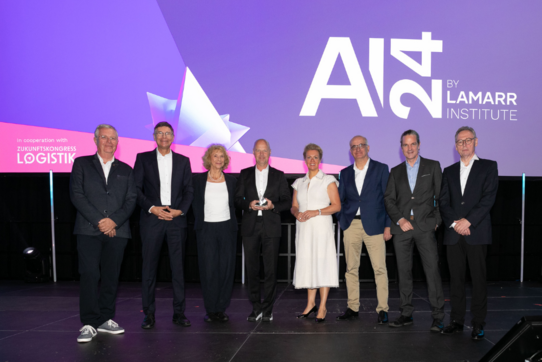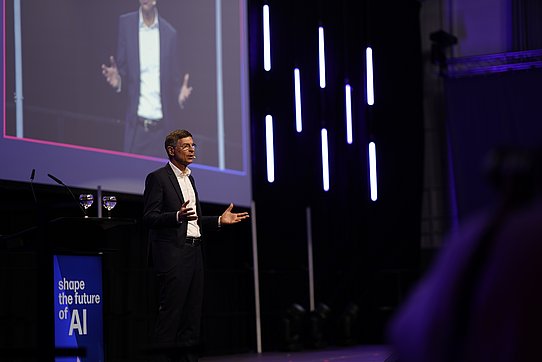b-it scientists at AI24 – the Lamarr Conference
The first scientific conference on artificial intelligence (AI) for application in Central Europe, “AI24 - The Lamarr Conference” of the Lamarr Institute for Machine Learning and Artificial Intelligence took place in Dortmund's Westfalenhallen. In cooperation with the “Zukunftskongress Logistik - 42nd Dortmunder Gespräche”, which has been established in Dortmund for over 40 years, everything revolved around current developments and future prospects of artificial intelligence in various application areas for the 700 or so participants on September 4 and 5 — from generative AI models and current AI technologies for industry and logistics to diverse research results and global trends for science, business, and society.

© Fraunhofer IML

© Maximilian Waidhas / b-it / Uni Bonn
To kick off the two-day conference, internationally renowned AI expert Prof. Dr. Dr. h.c. mult. Sebastian Thrun was presented with the first “Lamarr Award”. B-it's Managing Director and Co-Director of the Lamarr Institute Prof. Dr. Stefan Wrobel as well as b-it's Prof. Dr. Jürgen Bajorath were actively involved in the conference in the form of talks and panel discussions. In addition, the scientists Dr. Akbar Karimi, Dr. Mounika Marredy and Vahid Sadiri Javadi, who work with Prof. Dr. Lucie Flek in our research group Data Science & Language Technologies Group, presented their research on language models in a workshop.
“AI algorithms and their machine learning will determine competition in the future — this applies to industry and logistics in particular,” said Prof. Dr. Michael ten Hompel, Co-Director of the Lamarr Institute at the opening of the conference. “That is why we are bringing together the best from all worlds at AI24 from research, industry, and politics — with the aim of creating new communities and discovering potential for cooperation in order to actively shape the future of applied AI.” Prof. Dr. Stefan Wrobel, Managing Director at b-it and Lamarr Co-Director, added: “We can only advance artificial intelligence with sustainably excellent, responsible and application-oriented cutting-edge research. I am therefore delighted that we have succeeded in bringing together outstanding experts from international science and industry here in Dortmund to discuss the latest trends, forward-looking technologies for the economy and the steps needed for effective AI education.”
How artificial intelligence is transforming research, business, and society
After welcoming addresses by Thomas Westphal, Mayor of the City of Dortmund, Bettina Stark-Watzinger, Federal Minister of Education and Research and Ina Brandes, Minister of Culture and Science of the State of North Rhine-Westphalia, the participants experienced the first major highlight of the conference: the first presentation of the “Lamarr Award” to the internationally renowned pioneer in the field of AI, robotics, autonomous driving and digital education Sebastian Thrun, Professor of Artificial Intelligence at Stanford University, former Vice President at Google and alumnus of Bonn Informatics. “We already have huge AI innovations in the pipeline that will gradually help us all to live better lives,” said Thrun in his keynote speech and called for: ”Germany should position itself as a global pioneer of this fundamental technology through a new level of curiosity and openness on the part of all members of society.”
The rest of the program offered participants exciting keynote speeches and panel discussions on generative AI, the AI education of future generations of researchers and users and the use of AI in industry and logistics. The transformation potential of the technology and how this can best be exploited through close cooperation between researchers and users became clear. For example, Dr. Magnus Sahlgren, Head of Research at AI Sweden, looked at the European perspective of generative AI in his keynote speech. Prof. Dr. Michael Henke, Managing Director of Fraunhofer IML, gave an introduction to the potential of AI in industry and logistics and outlined the path to the digital continuum of AI.
Top AI research with radiance — from NRW and the world
The second day of the event on September 5 was opened by Hendrik Wüst MdL, Minister President of North Rhine-Westphalia. In the run-up to the conference, Wüst spoke out in favor of strengthening the networking of AI research and industry: “North Rhine-Westphalia is consistently taking the path from coal to AI: laboratories and research facilities are now located where hard coal was once mined. Where lignite is still mined today, data centers and data crosses are being planned. For North Rhine-Westphalia, the research and application of artificial intelligence is an important topic for the future. Artificial intelligence is also a key driver for our business location, as the structural change in many regions of the state shows. The state has set itself an ambitious goal: We want to become the leading digital region in Europe. That is why it is good that not only the scientific foundations but also the industrial fields of application of artificial intelligence are being discussed and researched. With its combination of networking, internationalization and proximity to industry, the Lamarr Institute offers exactly the right basis for this.”
Keynote speeches on large-scale language models for dialog systems by Amazon AGI expert Prof. Dr. Jens Lehmann and AI in astrophysics by Prof. Dr. Phil Diamond from the Square Kilometre Array Observatory then showed perspectives for a new generation of AI assistants and the influence of AI on pioneering international research collaborations.
The afternoon offered a wide-ranging program, with parallel thematic and workshop sessions led by leading national and international experts. Participants were able to gain in-depth knowledge of various current AI application areas and solutions: The “Fellows” of the Lamarr Institute — six outstanding AI researchers from North Rhine-Westphalia — will provide insights into current AI research from NRW. There will also be sessions on topics such as robotics and specific applications of AI in the natural sciences, such as physics and the life sciences with a focus on pharmaceuticals, and in industry and logistics. Other key topics included instruments for regulating artificial intelligence such as the European Union's AI Act, the use of foundation models and large language models as well as explainable AI.
To the original press release:
https://lamarr-institute.org/de/news/ai24-lamarr-conference/
